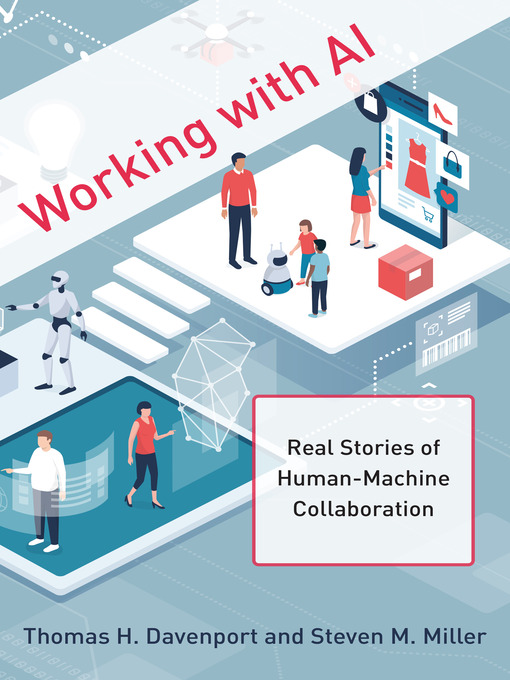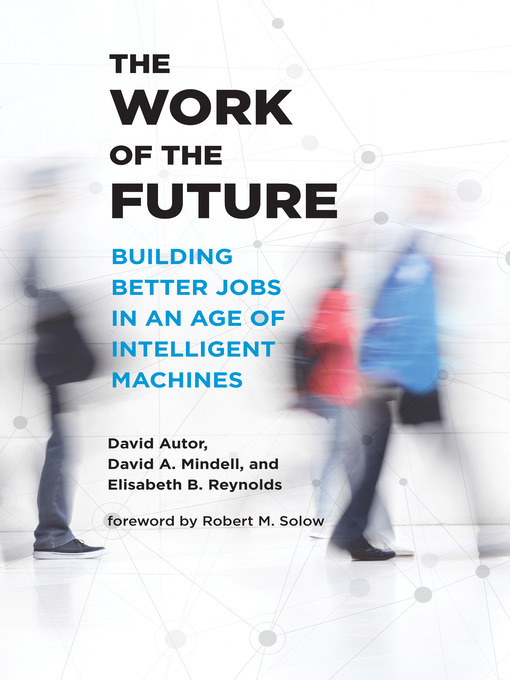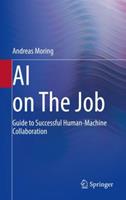Artificial Intelligence and the Future of Work
Artificial Intelligence and the Future of Work
Artificial intelligence (AI) is one of the most significant technologies today. In general, the field of AI seeks to create machines with human-like characteristics.
From automation to augmentation and beyond, AI is changing how business gets done and offering great potential to benefit the whole of society. Many CEOs agree that AI will markedly change the way they do business. AI has enabled companies such as Google and Apple to become among the largest in the world.
Key Takeaways
- Experts predict that it is unlikely that AI will lead to mass unemployment.
- Studies show augmentation is a more desirable and common outcome than large-scale automation.
- By working together, AI systems and humans can augment and complement each other’s skills.
Will AI Lead to Mass Unemployment?
Will AI result in an underclass of people who become unemployable because computers are doing their jobs? Experts opine that it is unlikely that AI will lead to mass unemployment. Like all previous labour-saving technologies, AI will enable new industries to form, creating more new jobs than are lost to the technology.
For the foreseeable future, AI will not lead to computers replacing people, but people and computers working together to perform cognitive and physical tasks that could not be done before.
How Will Work Change with AI?
AI has huge potential to increase productivity growth and contribute to the global economy. AI will increase the number of tasks that computers can do faster, less costly, or better than people.
The ability to adapt to entire novel situations is a major challenge for AI and robotics, and a main reason why companies still need human workers for a variety of tasks. Human workers are valuable and excel at social interaction, unpredictable physical skills, common sense, and general intelligence.
In the foreseeable future, there are some opportunities for AI in tasks such as:
- Sensing. AI systems today are already good at analysing many kinds of images, sounds, motions, and other inputs.
- Creating. Many kinds of creation involve patterns that machines can learn. The GPT-3 system (which stands for Generative Pre-trained Transformer 3), for example, is trained to generate human-like text.
How Can AI and Humans Collaborate?
Studies show that augmentation is a more desirable and common outcome than large-scale automation. Augmentation occurs when workplaces combine smart machines with humans in close partnerships, symbiotically leveraging both human intelligence and machine intelligence. Worker augmentation reinforces the belief that technology is not replacing human labour en masse anytime soon.
AI is used as a tool to complement the capabilities of a human worker. AI systems are better than humans at certain tasks such as crunching numbers, identifying patterns, and recalling information. Humans are better than AI systems at tasks that require general intelligence such as non-routine reasoning and defining abstractions, as well as interpersonal and physical skills. By collaborating, AI systems and humans can augment and complement each other’s skills.
References
-
Malone, Thomas, Daniela Rus, and Robert Laubacher. Artificial Intelligence and the Future of Work. MIT Work of the Future, December 17, 2020. https://workofthefuture.mit.edu/document/2020-research-brief-malone-rus-laubacher-2/
-
Miller, Steven Mark, and Tom Davenport. AI and the Future of Work: What We Know Today. Gradient (Research Collection School of Computing and Information Systems), December 2021. https://ink.library.smu.edu.sg/sis_research/6657/
-
Rao, Anand, Flavio Palaci, and Wilson Chow. This is What the World’s CEOs Really Think of AI. World Economic Forum, June 25, 2019. https://www.weforum.org/agenda/2019/06/ai-will-shape-our-future-how-do-we-ensure-it-is-used-responsibly
Further Reading
Learn more about how artificial intelligence will change the workplace, and how you need to understand these shifts when you plan for the future.
Websites
6 Positive AI Visions for the Future of Work
This article summarises the experts’ views on the positive artificial intelligence (AI) economic futures in a world of increasingly capable technologies. Many leading authorities believe machines may outperform humans at every task within 45 years. The article provides six AI scenarios that could build a positive future, namely shared economic prosperity; realigned companies; flexible labour markets; human-centric AI; fulfilling jobs; and civic empowerment and human flourishing.
Russell, Stuart and Daniel Susskind. “6 Positive AI Visions for the Future of Work.” World Economic Forum, November 24, 2021. https://www.weforum.org/agenda/2021/11/positive-artificial-intelligence-visions-for-the-future-of-work/
AI Empowers Employees, Not Just Companies
This paper examines how individuals use artificial intelligence (AI) at work and how they can derive personal value from AI. Personal value from AI materialises when using AI leads to greater competency, increased autonomy, and stronger relationships with co-workers, customers, business partners and other stakeholders. Organisations achieve significant benefits from AI when their workers also reap benefits from the technology.
Ransbotham, Sam, et al. “AI Empowers Employees, Not Just Companies.” Boston Consulting Group, November 1, 2022. https://www.bcg.com/publications/2022/the-value-of-ai-for-individuals
The Future of Jobs in the Era of AI
The increasing use of automation, artificial intelligence, and other technologies suggests that the role of human workers in the workplace will diminish. The paper argues that though these technologies will displace some jobs, they will create many others. Governments, companies, and individuals need to understand these changes when they plan for the future.
Strack, Rainer, et al. “The Future of Jobs in the Era of AI.” Boston Consulting Group, March 18, 2021. https://www.bcg.com/publications/2021/impact-of-new-technologies-on-jobs#workforce-imbalances
Is AI Really a Paradigm Shifting Phenomenon for How We Work?
Artificial Intelligence (AI) is viewed as a driving factor of the fourth industrial revolution. AI is predicted to change the way people work and cause restructuring of the labour market. Workers will need new skills, abilities and ways of learning to be more adaptable. This article discusses how we can respond to this change, and whether there are lessons from the past to learn from.
Hollis, Helena, and Cornelia Evers. “Is AI Really a Paradigm Shifting Phenomenon for How We Work?” Disruptive Voices (University College London), December 1, 2021. https://medium.com/disruptive-voices/is-ai-really-a-paradigm-shifting-phenomenon-for-how-we-work-9e3edf530828
The Future of Jobs in the Era of AI
This article posits that artificial intelligence (AI) is expected to help humans in the future, not replace them. The demand for adaptability is expected to increase as workforce automation grows. Workers need to develop skill sets that cannot be done well by AI, including creativity, interpersonal skills, and sensing. The future of jobs hinges on how well people understand AI and use their unique skills to improve AI systems.
Minevich, Mark. “The Future of Jobs in the Era of AI.” Fast Company, October 21, 2021. https://www.fastcompany.com/90684437/the-future-of-jobs-in-the-era-of-ai
How is Artificial Intelligence Shaping the Future of Work?
The four ways that artificial intelligence (AI) will influence the future of work are AI could help understand humans’ unconscious bias during the hiring process; automating routine tasks could free up human time; humans and AI will work together; and AI will create new jobs. Research shows that automation and augmentation are not necessarily resulting in fewer jobs.
Cariou, Lili. “How is Artificial Intelligence Shaping the Future of Work?” BusinessBecause, March 21, 2022. https://www.businessbecause.com/news/insights/8097/ai-future-of-work?sponsored
The Robots Are Coming. Is Your Firm Ready?
This paper argues that the robot revolution is unavoidable given the advances in artificial intelligence and other technologies that are rapidly changing the workplace. It explains how automation is changing the workplace in unexpected ways. Robots can boost efficiency and even create more jobs for their human counterparts. But more robots may also render some managers obsolete.
“The Robots Are Coming. Is Your Firm Ready?” Knowledge at Wharton, June 21, 2021. https://knowledge.wharton.upenn.edu/article/the-robots-are-coming-is-your-firm-ready/
Shaping Artificial Intelligence for Your Future Business Needs
History suggests that when jobs are displaced by new technology, they will ultimately be replaced by new roles. This article discusses how artificial intelligence (AI) will impact the workforce, the importance of AI–human collaboration, and the societal challenges of AI. AI is a general-purpose technology, and as a society we can shape that purpose through the choices that individuals, companies and policymakers make.
Shah, Hetan. “Shaping Artificial Intelligence for Your Future Business Needs” The Chartered Institute of Personnel and Development, August 22, 2022. https://www.cipd.co.uk/knowledge/work/trends/future-work-insights/shaping-ai-for-business
Journal Articles
Artificial Intelligence and the Future of Work: A Proactive Strategy
Advances in artificial intelligence (AI) and related tools have huge potential for driving productivity and will have major effects on the quality and quantity of work in the future. This paper discusses how to harness the use of AI in constructive ways and mitigate the negative effects it will have on jobs. AI can be developed in ways that augment human workers; and it will displace some numbers of workers. The author outlines a strategy for addressing these issues.
Kochan, Thomas. Artificial Intelligence and the Future of Work: A Proactive Strategy. AI Magazine 42, no. 1 (2022). https://ojs.aaai.org/index.php/aimagazine/article/view/7387/14947
Artificial Intelligence and the Future of Work: A Functional-Identity Perspective
This paper examines the impact of the use of artificial intelligence (AI) on workers’ experiences. Although AI can benefit workers, it can also cause psychological harm such as degrading work quality. As the adoption and capabilities of AI expand, workers, organisations, and broader society must manage these changes so that workers can grow and develop toward meaningful work selves.
Selenko, Eva, et al. Artificial Intelligence and the Future of Work: A Functional-Identity Perspective. Current Directions in Psychological Science 31, no. 3 (2022). https://journals.sagepub.com/doi/pdf/10.1177/09637214221091823?download=true
Artificial Intelligence and Employment: New Cross-Country Evidence
Recent advances in artificial intelligence (AI) have raised concern about the impact of technological progress on employment, including on worker displacement. This report studies the links between AI and employment in 23 countries. Overall, there appears to be no clear relationship between AI exposure and employment growth. However, greater exposure to AI is connected with higher employment growth in occupations where computer use is high.
Georgieff, Alexandre, and Raphaela Hyee. Artificial Intelligence and Employment: New Cross-Country Evidence. OECD Social, Employment and Migration Working Papers no. 26531 (December 2021). https://www.oecd-ilibrary.org/deliver/c2c1d276-en.pdf?
E-Books
Retrieved from [OverDrive](https://nlb.overdrive.com/). (myLibrary ID is required to access the eBook)
| Title | Description |
|---|---|
 |
Many companies and workers are now using artificial intelligence (AI). Using real-world case studies of AI-augmented jobs, including organisations from Singapore, two management and technology experts show that AI is not a job destroyer. Rather, AI transforms the way we work by taking over some tasks but not entire jobs, freeing humans to do other more challenging work. Davenport, Thomas H., and Steven M. Miller. Working with AI: Real Stories of Human-Machine Collaboration. New York: MIT Press, 2022. |
 |
New technology has transformed large parts of the economy, improving the skills of higher paid knowledge workers. But many workers with low-quality, low-wage jobs have benefited very little. This book argues that we can build better jobs if we can foster institutional innovations that complement technological change, and support workers through long cycles of technological transformation. Autor, David, David A. Mindell, and Elisabeth B. Reynolds. The Work of the Future: Building Better Jobs in an Age of Intelligent Machines. New York: MIT Press, 2022. |
Book
| Title | Description |
|---|---|
 |
This book offers a practical guide to using artificial intelligence (AI) in the workplace. The only way to leverage the full potential of AI is when people look forward to productive collaboration with intelligent machines. The book provides an overview of how and where AI can be used in companies, as well as how to identify the right areas of applications for AI in your workplace. Moring, Andreas. AI on the Job: Guide to Successful Human-Machine Collaboration. Heidelberg: Springer-Verlag GmbH Germany, 2022. Call no. 658.0563 MOR |
Video
How to Succeed with AI Augmentation
Although there are many remarkable tasks that machine learning and advanced analytics can do, there are a lot of things that AI-enabled machines still cannot perform. This video recommends designing AI applications that leverage what humans and machines each do best, and how they can work together most effectively.
MIT Sloan Management Review. (2022, October 21). How to Succeed with AI Augmentation. https://sloanreview.mit.edu/video/how-to-succeed-with-ai-augmentation/
Podcast
Working Well with AI
Artificial intelligence (AI) has long been predicted to transform our working lives. AI has advanced rapidly over the last decade. This podcast series discusses how AI is changing the world of work. Across five episodes, Prof Rose Luckin discusses the future impacts of AI on the ways we work with experts from industry, policy and academia.
University College London Minds. (2021, November). Working Well with AI. https://www.ucl.ac.uk/ucl-minds/podcasts/working-well-ai
All Rights Reserved. National Library Board Singapore 2022.

